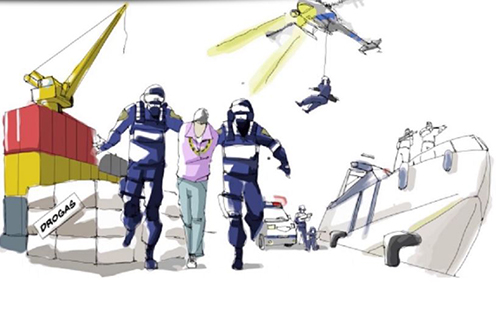Fight against drug trafficking
Break-up of major smuggling operation engaged in bringing drugs into Spain by sea destined for Libya and Egypt
News - 2016.11.23
The operation was launched in Melilla six months ago by the Organic Unit of the Judicial Police of the Headquarters in Melilla under guidance and leadership from Criminal Investigation Court Number 3 of Melilla, which declassified the legal proceedings earlier this week. Meanwhile, the investigation carried out by the Malaga branch was launched in December 2015, under guidance and leadership from Criminal Investigation Court Number 3 of Malaga.
An operational analysis of the two investigations revealed the magnitude of this operation, with cells based in Melilla and in Malaga, Lorca (Murcia), Algeciras (Cadiz) and Alicante responsible for the logistical management, acquisition and preparation of boats, and the storage and distribution of hashish-based drugs both in Spain and in various other European countries, mainly France and Germany.
Modus operandi
The organisation operated in two ways. The first consisted of using vehicles with concealed compartments brought from Europe to Melilla to smuggle the drugs either through the Port of Melilla or the Port of Nador (Morocco) heading for the ports of Motril, Malaga and Almeria.
To do this, the organisation looked for people to drive these "drug mule cars" who would not attract attention from the authorities, such as families with small children, and analysed arrest patterns in order to use the port offering the greatest chance for success during these "drug transfers". Once the drugs were in mainland Spain, they were kept at "safe houses" for subsequent overland distribution to various parts of Spain and other European countries, specifically France and Germany.
The second and most common method adopted by the organisation consisted in the acquisition of mother ships. To do this, it first set up a bogus company, put someone in charge, obtain legal documents for the ships so as not to raise suspicions and then made modifications to the fuel tanks in order to make long sea voyages.
This enabled them to set sail and transfer the drugs from smaller vessels to the mother ships in the international waters of Algeria under high security measures and at night. Once loaded, the ships would sail with the drugs to Libya and Egypt, destinations where profits could be quadrupled.
Operations at sea
In international waters some 100 miles off the coast of Algeria, the Maritime Service of the Spanish Guardia Civil carried out two boarding operations with support from the Air Service of the Spanish Guardia Civil and the Customs Surveillance Service of the Spanish Tax Office. The first took place on board a 14-metre yacht sailing out of the Almerimar Marina (Almeria) under a German flag (which turned out to be fake), on which 950 kilos of hashish were discovered. The second took place on board a 17-metre yacht sailing out of the Mazarrón Marina (Murcia) under a Spanish flag, on which 4,000 kilos of hashish were discovered.
Having identified all members of the organisation and the targets, a two-stage operation was carried out in a coordinated fashion in the provinces of Melilla, Malaga, Murcia, Cadiz and Almeria consisting of various property searches. Over 200 kilos of hashish were discovered at one of the "safe houses" in Villa Nueva de la Concepción (Malaga), intended for subsequent distribution. Strong security measures had been adopted at this location and small arms were present for defence purposes.
Final result from the operation
The investigation was jointly carried out by the Organised Crime and Anti-Drug Squads (Spanish acronym: EDOA) of the Organic Units of the Judicial Police of the Spanish Guardia Civil Headquarters in Melilla, Malaga and Alicante, the Drugs and Organised Crime Unit (Spanish acronym: UDYCO) of the Spanish National Police Force in Lorca (Murcia) and Alicante, and by officers of the Spanish Tax Office in Alicante.
Given the size and scope of the operation, support was provided by the Maritime and Air Services of the Spanish Guardia Civil and the Customs Surveillance Service of the Spanish Tax Office. The operation led to the arrest and taking into custody of 25 people, including the leaders of the organisation based in Melilla, Malaga and Murcia. The majority of them have Spanish or Moroccan nationality. Furthermore, over five and a half tonnes of hashish, numerous cars, a yacht, a pleasure craft and five inflatable boats plus their engines, three short guns plus ammunition (two real and one imitation), cash, telephones, computers and a significant amount of documents were confiscated, which are now being studied.






